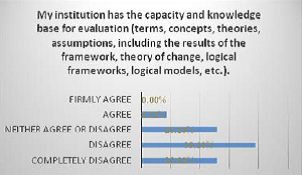Author: Nijaz Avdukić
In Bosnia and Herzegovina in general, and in the public administration of the Federation of Bosnia and Herzegovina, the capacities for the absorption of EU funds and the implementation of monitoring and evaluation (impact evaluation or assessment) of projects/laws/policies are extremely low.
Bosnia and Herzegovina is currently withdrawing European pre-accession funds ranging up to EUR 500 million in a seven-year period, with a percentage of absorption of over 90%, which points us to the conclusion that BiH has good absorption capacities. However, these pre-accession funds are implemented by a centralized system, where the European Commission is in charge of all procurements, announcements and approvals of projects, and eventually, for carrying out evaluations of these projects. However, practice has shown that in all Eastern European countries, including Bosnia and Herzegovina, there are generally such problems that are related to absorption capacities for European funds, as well as capacities for conducting monitoring and evaluation of the projects financed by European funds. For the implementation of European funds, all countries are obliged to develop a monitoring system, including the system of evaluation in one part (strategic documents, programs and projects), which is one of the key elements of the implementation of the pre-accession, and later on, structural and cohesion funds of the European Union.
Research on this area was carried out at the end of 2016 in federal and cantonal institutions and is part of a wider research aimed at analysing the absorption capacities for EU funds in BiH and FBiH. Since the construction of these capacities have been lasting relatively long, we wanted to check the current monitoring and evaluation capacities in the Federation of Bosnia and Herzegovina (federal institutions and cantonal governments) in order to strengthen and be timely prepared for a larger absorption.
In general, in the public administration of the Federation of BiH, there is insufficient understanding of the concept of evaluation (and monitoring) and key elements of the evaluation. Conducting evaluations within public services in the Federation of Bosnia and Herzegovina is insufficient and sporadic. One of the reasons for poor understanding is that only 17.4% of all respondents stated that in the last three years they participated in some of the training in the field of monitoring or evaluation. This suggests that insufficient attention is paid to these areas within the public administration, as well as that there is no sufficiently clear obligation in terms of implementing such evaluation within the public administration system of Bosnia and Herzegovina.
Almost 61% of the interviewed representatives of the federal and cantonal institutions generally consider that the Federation of Bosnia and Herzegovina has no material or human capacities for monitoring practice, that is, monitoring the state of affairs in the areas of competence, despite the fact that, according to 74% of the respondents, their institutions have adequate databases that can be used for monitoring. Furthermore, more than two thirds of the respondents believe that our statistical system does not have adequate indicators for monitoring needs, i.e. monitoring of the situation in certain areas.
When it comes to the knowledge of evaluation in the Federation of Bosnia and Herzegovina in general, there is a poor knowledge and understanding of the significance of evaluation, as only 26% of the respondents answered that the civil servants within the public administration were aware of the purpose and importance of evaluating or assessing impacts of a project / law / policy.
 Source: Author
Source: Author
Only 8.7% of respondents agree with the assertion that their institutions have the capacity and knowledge base to assess impact /evaluation (terms, concepts, theories, assumptions, including the results of the framework, theory of change, logical frameworks, logical models, etc.).
 Source: Author
Source: Author
In addition to insufficient capacities for understanding and conducting monitoring and/or assessing impact of certain solutions (evaluation) within the public administration of Bosnia and Herzegovina, only 17.4% of respondents consider that there are adequate capacities (universities, institutes, private consulting houses, etc.) for providing services in implementing external evaluation.
In the end, the results undoubtedly show low capacity of public administration and academic community in understanding the significance and implementation of evaluations, what certainly points to the need to further strengthen these capacities through the introduction of a legal framework for evaluations, specially designed training for public administration in the field of evaluation, strengthening of capacities of academic community, promotion of the importance of conducting evaluations from the aspect of responsibility, as well as acquiring knowledge in spending public funds.


